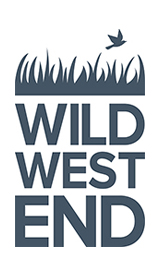Target species
Birds
Many species of birds are in decline worldwide due to a reduction in appropriate food sources and preferred nesting habitats. This is markedly the case in the West End. New sustainable buildings lack the nooks and crannies for birds to nest in, and the modern manicured gardens provide little foraging opportunity to provide them with sustenance. Yet, birds are important pest controllers, seed dispersers, and they also help eliminate waste food. In addition, bird song is known to contribute to human well-being.
Wild West End is providing nesting and feeding opportunities for birds to counter their decline.
Bats
Bats are an important measure of environmental quality; their presence indicates that there are sufficiently diverse food resources to provide habitat for their prey species to develop. Bats are hugely important in global ecosystems as pollinators and seed dispersers, but in the UK they also provide a role in pest control. A single pipistrelle bat is thought to be able to eat over a thousand midges and mosquitos in just one night. So bats provide a valuable service to people and agriculture as they reduce disease vectors and farmland pests.
Wild West End will encourage these species to regain their range within central London by providing a diverse range of habitats to support their prey and building bat houses.
Invertebrates
Although diminutive and often unseen, invertebrates support numerous ecosystems and are essential to life. Invertebrates pollinate flowers and crops, thereby providing us with the food we rely on. They decompose all manner of waste products including discarded food, vegetation and dung. Some invertebrates feed on agricultural pests, or on insects that cause our flowers to fail.
Although invertebrates are themselves an essential food source for birds and mammals, Wild West End recognises them as an important species in their own right. Through providing a diverse range of habitats and conditions, Wild West End hopes to attract a similarly diverse range of invertebrates.
Flora
Underpinning all of our efforts to increase the numbers of fauna within the West End will be our planting schedules. The flowers, trees and climbers which will be incorporated into developments will provide pollen, nectar, fruits and seeds to sustain as many species as possible. They will also provide varying climatic conditions and a wealth of sheltering or nesting opportunities to encourage as many invertebrates, birds and bats as possible to become residents of the area.
Abundant flora will create an attractive environment for the local community. Fragrant and edible plant species are being selected based on their ability to tolerate not just the existing conditions, but also the likely warmer and drier conditions of the future.





